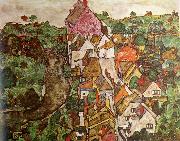Wholesale Oil Painting No Minimum |
|||||||||||
|
|
|||||||||||

|
|||||||||||
|
|
|
||||||||
Egon Schiele1890-1918 Austrian Egon Schiele Gallery Egon Schiele (12 June 1890 ?C 31 October 1918) was an Austrian painter, a protege of Gustav Klimt, and a major figurative painter of the early 20th century. Schiele's body of work is noted for the intensity and the large number of self-portraits he produced. The twisted body shapes and the expressive line that characterize Schiele's paintings and drawings make the artist an early exponent of Expressionism, although still strongly associated with the art nouveau movement (Jugendstil). The most important collection of Schiele's work is housed in the Leopold Museum, Vienna. In 1907, Schiele sought out Gustav Klimt. Klimt generously mentored younger artists, and he took a particular interest in the gifted young Schiele, buying his drawings, offering to exchange them for some of his own, arranging models for him and introducing him to potential patrons. He also introduced Schiele to the Wiener Werkstätte, the arts and crafts workshop connected with the Secession. In 1908 Schiele had his first exhibition, in Klosterneuburg. Schiele left the Academy in 1909, after completing his third year, and founded the Neukunstgruppe ("New Art Group") with other dissatisfied students. Sitzender weiblicher Akt, 1914Klimt invited Schiele to exhibit some of his work at the 1909 Vienna Kunstschau, where he encountered the work of Edvard Munch, Jan Toorop, and Vincent van Gogh among others. Once free of the constraints of the Academy's conventions, Schiele began to explore not only the human form, but also human sexuality. At the time, many found the explicitness of his works disturbing. |
||||||||
|
|
||||||||
Landscape at Krumau
Landscape at Krumau Painting ID:: 47990 |
mk189
1916
mk189 1916 |
|||||||
|
CONTACT US |

